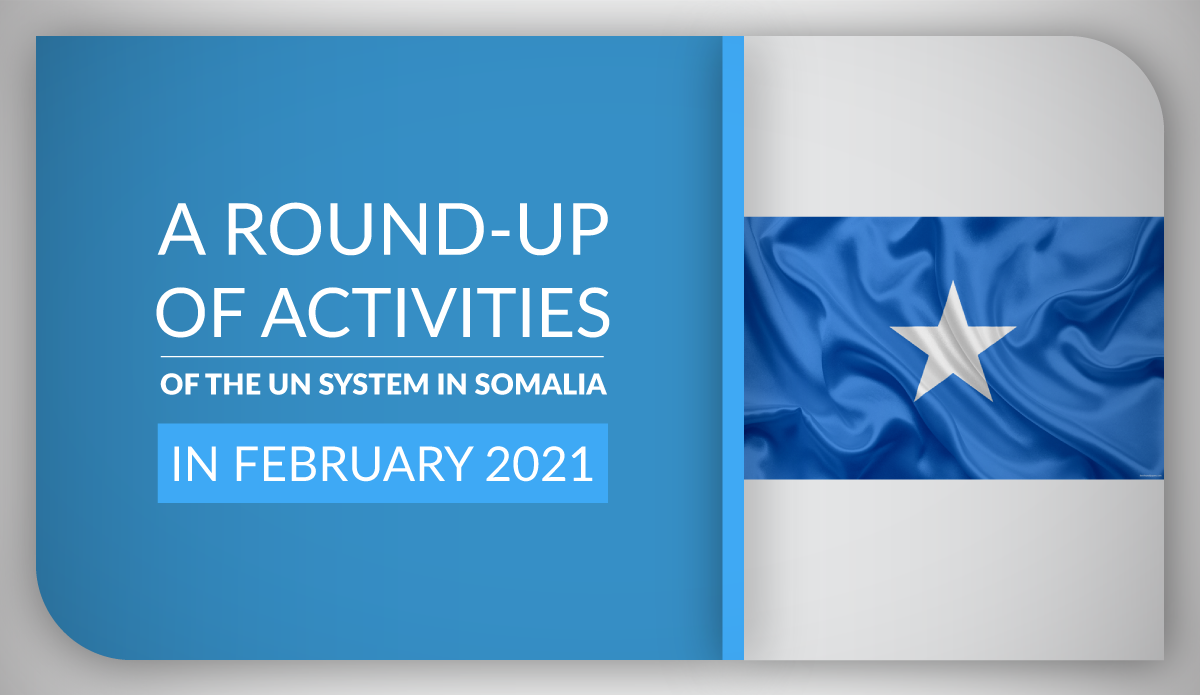A round-up of activities of the UN system in Somalia in February 2021
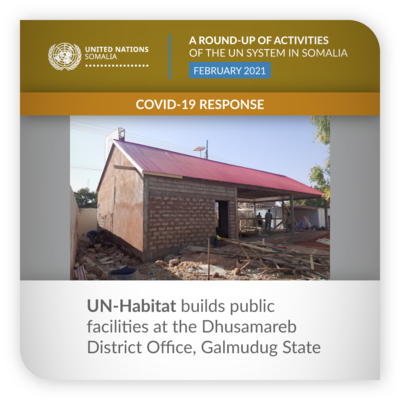 |
Public Space | UN-Habitat builds public facilities at the Dhusamareb District Office, Galmudug State Facilities will include a high roofed multifunctional area, two rooms and latrines. The premise will have a neatly lawned space with vegetation, creating a conducive environment where members of the community can gather and socialize. This construction project is part of a wider Settlement Development Plan that is currently being developed by UN-Habitat in close collaboration with the local authorities. |
|
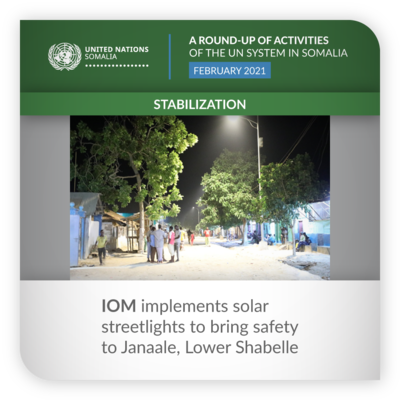 |
Stabilization | IOM implements solar streetlights to bring safety to Janaale, Lower Shabelle https://ec.europa.eu/fpi/news/solar-streetlights-make-residents-janaale-somalia-safe-night_en |
|
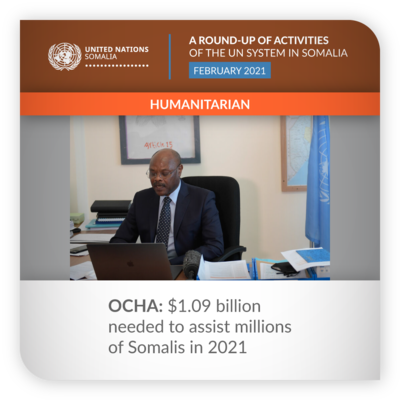 |
Humanitarian | OCHA: $1.09 billion needed to assist millions of Somalis in 2021 The Federal Government of Somalia and the United Nations launched the 2021 Somalia Humanitarian Response Plan (HRP), which seeks $1.09 billion to provide life-saving assistance to four million people who will be in critical need of humanitarian assistance across the country this year. According to OCHA, the UN’s humanitarian coordination agency, the humanitarian situation in Somalia worsened in 2020, compounded by the ‘triple threat’ of floods, COVID-19 and desert locusts. In 2021, the country is projected to face more significant humanitarian challenges. Drought conditions are predicted due to the likely below-average rainfall associated with La Niña, and the country will have to handle the ongoing impact of COVID-19 on the economy. The HRP estimates that 5.9 million people will need humanitarian assistance this year, an increase from 5.2 million last year. |
|
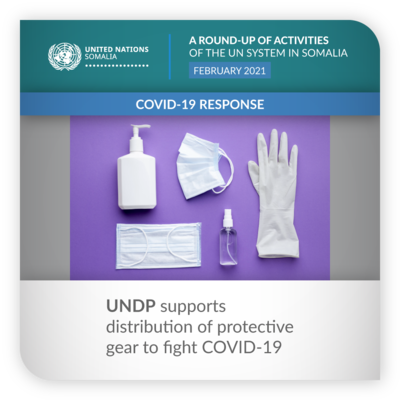 |
COVID-19 Response | UNDP supports distribution of protective gear to fight COVID-19 As part of UNDP’s support for the Banadir Regional Authority’s response to the COVID-19 pandemic, and with funding from Japan, supplies of masks, gloves, hand sanitizer and soap were delivered to the Martini Hospital, in Mogadishu. More deliveries over the coming weeks will bring similar supplies to hospitals and health centres around the city, in an effort to help protect people where it is needed most. |
|
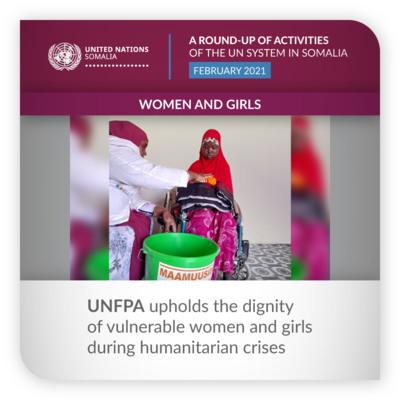 |
Women and girls | UNFPA upholds the dignity of vulnerable women and girls during humanitarian crises UNFPA continues to provide access to life-saving integrated sexual and reproductive health and gender-based violence services, including the provision of COVID-19 adapted dignity kits for Somali women and girls. As part of the response to women and girls' specific needs, UNFPA and its partner, Somali Birth Attendants Cooperative Organisation (SBACO), have distributed 300 dignity kits to marginalized women and girls in the surrounding areas of the city of Galkayo. |
|
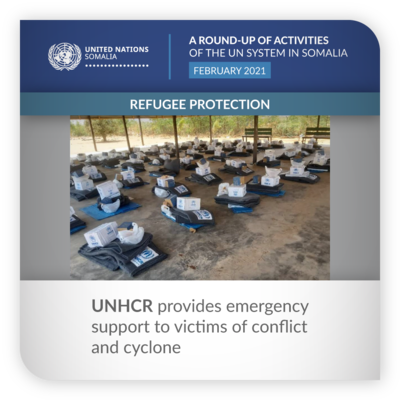 |
Refugee Protection | UNHCR provides emergency support to victims of conflict and cyclone UNHCR, through its implementing partner African Volunteers for Relief and Development (AVORD), provided non-food items (NFSIs) to at least 3,000 people in Qansaxley and Kapasa settlements for internally displaced people. Those targeted in the settlements were affected by the recent conflict in Belet Hawo, in Jubaland’s Gedo region, which displaced thousands of people. Meanwhile, in Puntland, close to 22,000 people have begun receiving cash assistance to restock their shelters which were destroyed by Cyclone Gati in December 2020. By March, UNHCR will have assisted more than 25,000 people affected by the cyclone with cash and NFIs in the districts of Bosaso, Bargal and Iskushuban. |
|
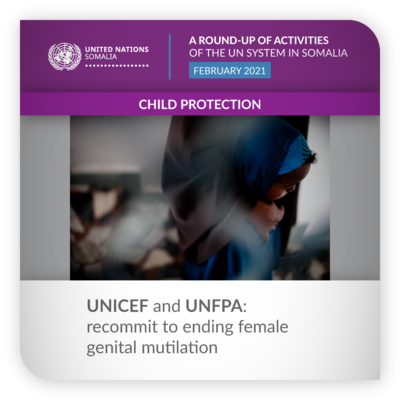 |
Child protection | UNICEF and UNFPA: recommit to ending female genital mutilation On the International Day of Zero Tolerance for Female Genital Mutilation, marked on 6 February, UNICEF and UNFPA called on the Government of Somalia to recommit to ending female genital mutilation (FGM) by passing a law that eliminates the practice. Somalia has one of the highest rates of FGM in the world. According to the latest Somali Health and Demographic Survey, 99 per cent of women between the ages of 15 and 49 have been subjected to this harmful practice. FGM is almost universally practised in the country for several reasons. Many religious and community leaders encourage the practise, wrongly justifying it as a religious necessity. Families also view cutting as a way of protecting their daughter’s chastity, a prerequisite for marriage. Through a variety of programmes, UNICEF and UNFPA are taking action to eradicate the practice in Somalia. The two agencies are working with communities to change attitudes and educate families on the life-threatening consequences of forcing young girls to undergo FGM. Besides the efforts to change traditional beliefs, the agencies say it is critical to provide a legal framework banning FGM and empowering families and communities to refuse girls to be cut – the passage of the FGM Bill would help to accomplish this and put an end to the abhorrent practice. |
|
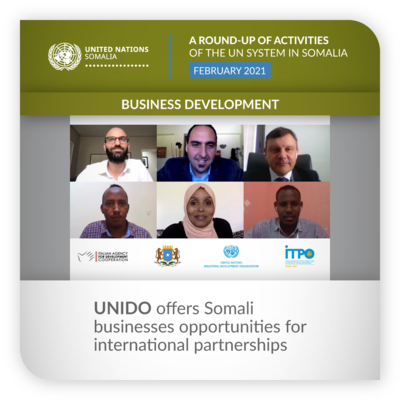 |
Business Development | UNIDO offers Somali businesses opportunities for international partnerships |
|
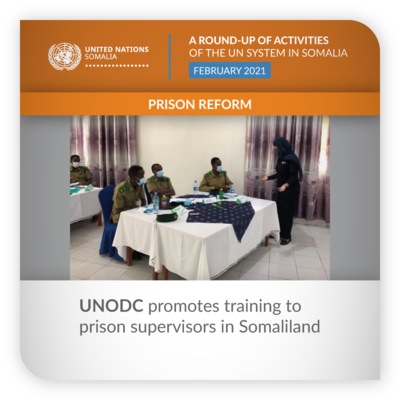 |
Prison Reform | UNODC promotes training to prison supervisors in Somaliland |
|
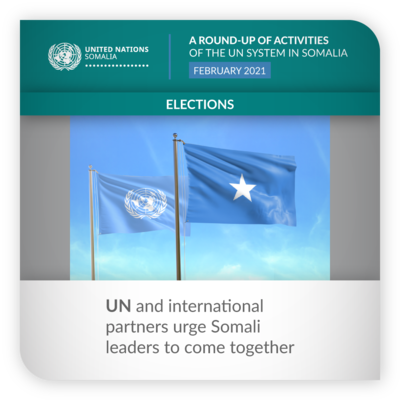 |
Elections | UN and international partners urge Somali leaders to come together In relation to Somalia’s elections, its international partners have called on all signatories of the 17 September agreement to come together urgently to finalize the implementation of the electoral model, building on the work of the Technical Committee which met in Baidoa on 15-16 February. In a joint statement, the partners said Federal and Member State leaders should also maintain open lines of communication with other Somali political leaders and civil society to ensure the elections have the broadest possible support and electoral bodies act with independence from political interests. |
|
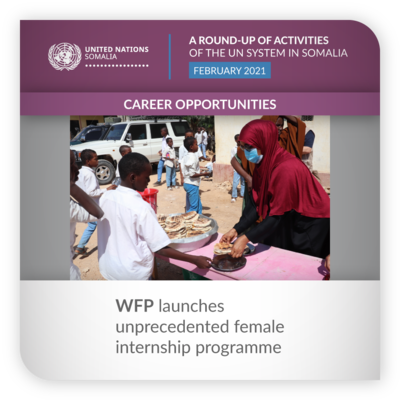 |
Career Opportunities | WFP launches unprecedented female internship programme WFP has launched a groundbreaking new female internship programme to provide first-time work experience and career opportunities to talented young female graduates. This unprecedented programme is part of WFP’s commitment to better gender parity and balance, and is a particularly important step in our context locally. As of February, 11 of a total 22 interns were already on board in Somaliland and Puntland, bringing a fantastic level of energy to their work across the spectrum of WFP’s operations – from logistics and livelihoods support to school meals and nutrition, in the office and in the field. The rest of the team will be joining in the coming weeks in different locations. |
|
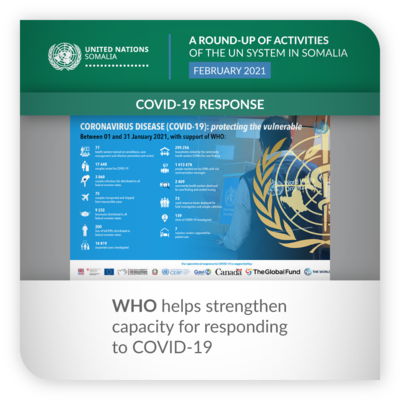 |
COVID-19 Response | WHO helps strengthen capacity for responding to COVID-19 Since the onset of the COVID-19 pandemic, WHO has supported the Somali authorities to develop preparedness and response capacities. In January 2021, 77 health workers were trained on surveillance, case management, risk communication and infection prevention and control. WHO supported regions to respond to COVID-19 by distributing 9,232 face masks for use by health workers and community volunteers and 3,060 sample collection kits. The UN health agency supported 2,409 community health teams, reached 1,413,478 people with risk communication messages, and visited 295,256 households in 51 districts to actively search for COVID-19 cases. In addition, a total of 159 alerts of COVID-19 were investigated with the support of 73 trained district rapid response teams. WHO continues to build diagnostic capacity for priority infectious diseases, including COVID-19, by providing training, technical support and providing supplies and re-agents. |
|
|
|
||
|
|
||
 UN
UN
